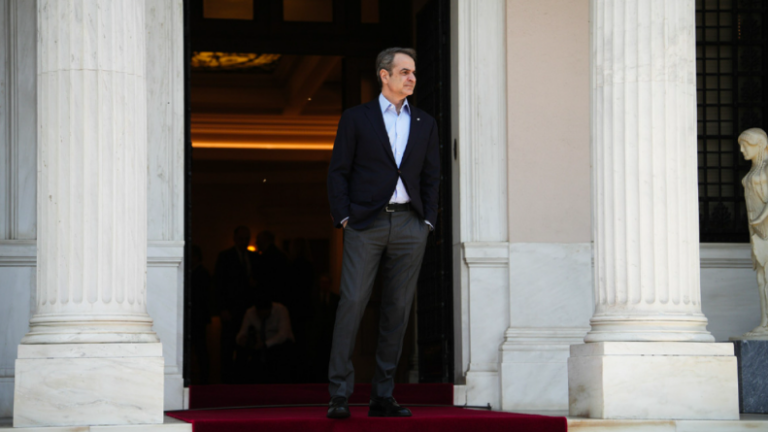The government has been prompted into action following the eagerness of ministers and MPs from the ruling party to push for the alignment of security forces’ salaries (Police, Fire Brigade, Coast Guard) with those of the Armed Forces. This follows the announcement by Defense Minister Nikos Dendias last Friday.
According to verified information from protothema.gr, government spokesperson Pavlos Marinakis is expected to “hint” at raises for all uniformed personnel during tomorrow’s press briefing. However, these increases are expected towards the end of the year, at which point Armed Forces personnel will also receive an additional pay raise. Government sources clarify that both Armed Forces personnel and all uniformed officers will receive a €30 increase on April 1st and a €100 increase from the hazardous duty allowance on July 1st. The new raise for the Armed Forces is already scheduled for the year’s end or potentially from January 1, 2026. More detailed announcements regarding the remaining salary adjustments will be made by Prime Minister Kyriakos Mitsotakis in September at the TIF.
Securing Budget Funds
Government sources emphasize that responsible ministers—Michalis Chrysochoidis (Police), Vassilis Kikilias (Coast Guard), and Giannis Kefalogiannis (Fire Brigade)—must also conduct cost-cutting exercises similar to those carried out by Defense Minister Dendias to enable salary increases for the Armed Forces. Notably, the Armed Forces’ pay adjustments were the result of months-long discussions with the Prime Minister’s office and the financial team, treating them as a special case, much like the salary raises granted to public healthcare doctors.
In light of this, protothema.gr has confirmed that senior government officials are displeased with how certain ministers brought the issue into public discussion. Vassilis Kikilias was the first to address the matter on ERT, followed by Adonis Georgiadis. Subsequently, multiple New Democracy MPs also expressed support for raising salaries across all special payroll categories. “Announcements are made by the Prime Minister, not individual ministers, and always in coordination with the financial team,” a senior government source pointed out.
The issue has sparked a flurry of political activity, with MPs making calls and issuing statements throughout the day. Former Minister Dimitris Avramopoulos set the tone the night before, backing the demands of uniformed personnel. So far, seven other ND MPs, primarily from the party’s right wing, have supported the proposal, including parliamentary representatives Thanos Plevris and Notis Mitarachi, as well as MPs Stelios Petsas, Dimitris Markopoulos, Andreas Katsaniotis, and Foteini Arabatzi. Former Shipping Minister and current Deputy Speaker of Parliament Giannis Plakiotakis has also taken a similar stance.
MPs’ motivations vary—some, like Stelios Petsas, have been advocating for the increases for some time, while others, such as Thanos Plevris, have strong support bases among uniformed personnel. Additionally, lingering discontent from the recent cabinet reshuffle has played a role in the discourse.
Why the Armed Forces Were Prioritized
Government sources highlight that defense spending is now treated as an exception by the EU, allowing for greater fiscal flexibility. Furthermore, due to the activation of the “escape clause,” additional budgetary space has been created.
They also stress the urgent need for intervention, citing a decline in applications to military academies and a wave of resignations in the Navy. Through cost-cutting measures and reductions in senior-ranking officers, Defense Minister Nikos Dendias secured the necessary funds for salary increases.
Why the Raises Were Announced Exclusively for the Armed Forces
According to government sources, this decision was driven by three key factors:
- EU Flexibility on Defense Spending – Recent European decisions have allowed for greater fiscal leeway, particularly in defense-related expenses, including military salaries.
- Defense Ministry’s Cost-Saving Strategy – Under the “Agenda 2030” program, the Defense Ministry has implemented structural reforms and budget cuts, including downsizing personnel, which helped fund the salary hikes.
- Retention and Recruitment Challenges – There is an urgent need to retain military personnel and attract new recruits to the Armed Forces, ensuring that military academies remain adequately staffed.
Officials note that this isn’t the first time a sector-specific salary increase has been announced. Similar initiatives have been introduced in recent months for public healthcare doctors, including incentives for staffing remote hospitals and the tax exemption for medical shift allowances.
Salary Increases for Security Forces Under Review
Regarding potential income support measures for security forces, government sources highlight that several steps have already been taken to boost salaries for all uniformed personnel, including police, coast guard, and firefighters.
- Since January 1, 2025, night duty allowances for uniformed personnel have increased.
- From April 1, all public sector and uniformed personnel salaries (including Armed Forces and security forces) will increase by €30 to align public and private sector base salaries after the minimum wage hike to €880.
- From July 1, all uniformed personnel (156,000 in total) will receive an additional €100 monthly hazardous duty allowance, with an estimated budget impact of €111 million in 2025 and €222 million in 2026.
It is expected that, as with the Armed Forces, the government will explore all available fiscal options for security forces, with final decisions tied to the TIF.
Government officials reiterate that the Defense Minister’s announced salary increases will take effect after the TIF. Overall, the government’s public sector wage policy is centrally managed by the financial team under the Prime Minister’s direction, ensuring a strategic, fiscally responsible approach rather than isolated, ad hoc declarations.
“Every initiative is part of a broader plan that includes cost-saving measures and safeguards fiscal stability. Since 2023, the Mitsotakis administration has allocated €2.1 billion in public sector salary increases—equivalent to an extra 1.3 months’ salary for all public employees. In essence, the 13th salary has already been granted, and with the upcoming raises, we are moving toward a 14th salary in the years ahead,” government sources conclude.
Ask me anything
Explore related questions





